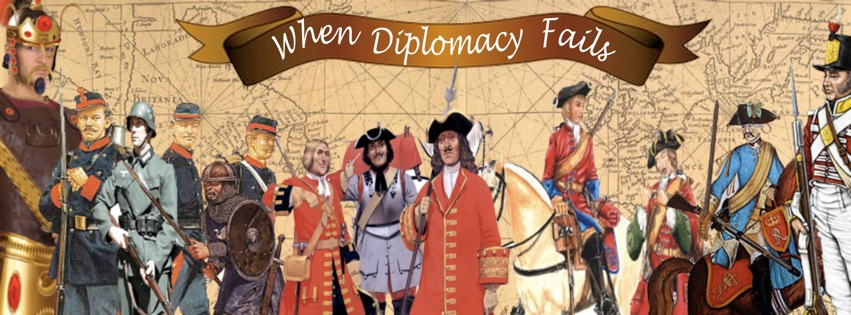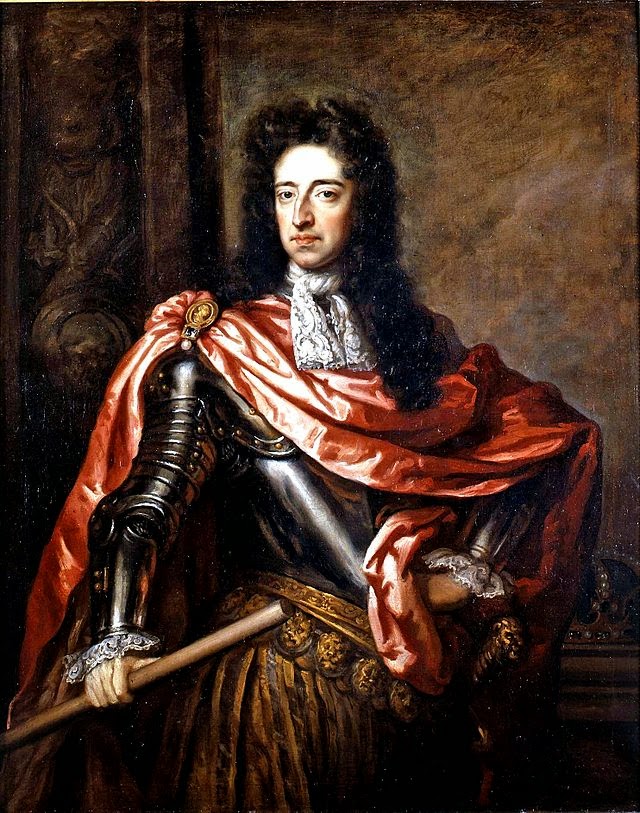Having defeated its Spanish enemy after 80 long years, nobody could have supposed that the Dutch Republic would do anything but prosper after 1648. The promise of peace resulted in a booming of Dutch ambitions around the world, and an even greater return on their worldwide investments. The Dutch could count no power their economic equal on the continent, and it certainly seemed as though their Golden Age would remain in place for the foreseeable future. History of course, is never so simple. The Dutch were in fact embarking on a collision course after 1648, though they could not have known it at the time. Their next enemy was to be, in many ways, their political and ideological twin and, in previous years, one of their closest trading partners.
The War of the Three Kingdoms had ravaged the British Isles on a level experienced during the Thirty Years War on the continent. The residual problems that the new English Commonwealth, founded in May 1649 only months after killing the King of England, Scotland and Ireland, Charles I. The civil wars in the British Isles had been raging on and off since 1643, and would not end convincingly in favour of the English Rump Parliament until late 1651. In those 8 years the conceptions of English, Scottish and Irish statehood would be pulled apart and would fray at the seams. In mid-1653 did the Commonwealth of England, Scotland and Ireland become transformed into the family dictatorship ruled over by Oliver Cromwell, but the turmoil that began in the early 1640's never truly went away in the meantime.
The causes of the war will be covered in the four episodes, but suffice it to say they revolved around commercial jealousies on the English part, as well as the Dutch inability to give the Rump what it wanted. In a bizarre logic, war would result because the Dutch could not agree on English terms for a union. The fundamental English desire was to secure its new regime against foreign threats caused the Rump's reps in The Hague to promote their case of union with the newly triumphant Dutch Republic.
Not wishing to jeopardise the state of affairs that their victory over Spain had secured, the Dutch remained unwilling to agree to a union that they perceived would become dominated by London. The Dutch had kept an eye on what the Rump had done; Ireland and Scotland had been subdued by force, and offers of a Commonwealth were believed to be the next step towards further domination by London. Why would the Dutch agree to such a lopsided union when they had everything to gain in the status quo? The English could not answer such a question, and because neither side were willing to give ground, tensions only escalated.
When the war did erupt, few could have anticipated what would happen next. Expecting a Dutch walkover, Europe was stunned to bear witness to the English domination of the war, thanks to its reliance on huge warships and its concentration on firepower that overwhelmed the old Dutch tactics. Still attempting to use the tactics that had enabled it to carve out its place atop the European food chain, fireships and undersized converted merchant vessels were what awaited the English first rates. The overwhelming impact of English superiority of fire and tactics weren't felt initially, but after a series of devastating defeats, the Dutch predicament became quickly desperate.
The War would only be ended with the Treaty of Westminster, where the Act of Seclusion would solve what Cromwell upheld to be the prime threat to the Commonwealth's security: the Orange family. Thus, the importance of the Orange family is revealed at this early a stage. William III of the House of Orange was barred from entering office in the Dutch Republic and, at just 4 years old, seemed destined to fade into obscurity thanks to the demands of the victorious English. Yet, times would change, and there would come a point when that same William III would rule both Britain and the Netherlands under a union. In a strange twist, it was just as the Rump had intended, yet the series of events that would lead to the Glorious Revolution of 1688 were directed at a common enemy, France, and by that stage the Anglo-Dutch relationship had come to symbolise all that the Rump originally hoped it would in 1651 when it had offered its seemingly impractical union. Of course, by 1688 it had taken three Anglo-Dutch Wars and the threat of an even greater enemy, Louis XIV, to change the relationship between the English and Dutch into an amicable one....
..........but these, are stories for another episode. So thanks for reading history friends, and I hope you enjoy the First Anglo-Dutch War!
Thanksssssssss
The Dutch Empire, with the lighter green shade denoting the imperial possessions and the darker green denoting the economic possessions in the early Republic. The orange dots essentially represent the warehouses and location of Dutch business that were responsible for Dutch Eastern commerce.

A modern map of the Dutch provinces. Nowadays Holland is divided into two separate provinces, but during our era it was one, and thus dominated the seafaring interests of the Republic.

The War of the Three Kingdoms had ravaged the British Isles on a level experienced during the Thirty Years War on the continent. The residual problems that the new English Commonwealth, founded in May 1649 only months after killing the King of England, Scotland and Ireland, Charles I. The civil wars in the British Isles had been raging on and off since 1643, and would not end convincingly in favour of the English Rump Parliament until late 1651. In those 8 years the conceptions of English, Scottish and Irish statehood would be pulled apart and would fray at the seams. In mid-1653 did the Commonwealth of England, Scotland and Ireland become transformed into the family dictatorship ruled over by Oliver Cromwell, but the turmoil that began in the early 1640's never truly went away in the meantime.
King Charles I of the British Isles, whose execution in early 1649 crystalised the radical new steps that the Three Kingdoms were keen to embark upon. 

The causes of the war will be covered in the four episodes, but suffice it to say they revolved around commercial jealousies on the English part, as well as the Dutch inability to give the Rump what it wanted. In a bizarre logic, war would result because the Dutch could not agree on English terms for a union. The fundamental English desire was to secure its new regime against foreign threats caused the Rump's reps in The Hague to promote their case of union with the newly triumphant Dutch Republic.
Not wishing to jeopardise the state of affairs that their victory over Spain had secured, the Dutch remained unwilling to agree to a union that they perceived would become dominated by London. The Dutch had kept an eye on what the Rump had done; Ireland and Scotland had been subdued by force, and offers of a Commonwealth were believed to be the next step towards further domination by London. Why would the Dutch agree to such a lopsided union when they had everything to gain in the status quo? The English could not answer such a question, and because neither side were willing to give ground, tensions only escalated.
Depiction of the States of Holland, where much of the most important decisions of the Republic were taken.jpg)
.jpg)
Building where the States-General, effectively the governing apparatus of the Dutch Republic, met for the purpose of crafting state policy. Present were representatives from all 7 Provinces, though Holland certainly had the most influence thanks to its position, thanks to its pride of place in the Republic.

When the war did erupt, few could have anticipated what would happen next. Expecting a Dutch walkover, Europe was stunned to bear witness to the English domination of the war, thanks to its reliance on huge warships and its concentration on firepower that overwhelmed the old Dutch tactics. Still attempting to use the tactics that had enabled it to carve out its place atop the European food chain, fireships and undersized converted merchant vessels were what awaited the English first rates. The overwhelming impact of English superiority of fire and tactics weren't felt initially, but after a series of devastating defeats, the Dutch predicament became quickly desperate.
Battle of the Gabbard Bank depicted in a painting; one of the most devastating losses suffered by the Dutch in their history; the loss here resulted in the scales finally falling from Dutch eyes.

Battle of the Kentish Knock, the first proper encounter between both sides, yet it wasn't conclusive enough to convince the Dutch that change to their strategy was badly needed.

The War would only be ended with the Treaty of Westminster, where the Act of Seclusion would solve what Cromwell upheld to be the prime threat to the Commonwealth's security: the Orange family. Thus, the importance of the Orange family is revealed at this early a stage. William III of the House of Orange was barred from entering office in the Dutch Republic and, at just 4 years old, seemed destined to fade into obscurity thanks to the demands of the victorious English. Yet, times would change, and there would come a point when that same William III would rule both Britain and the Netherlands under a union. In a strange twist, it was just as the Rump had intended, yet the series of events that would lead to the Glorious Revolution of 1688 were directed at a common enemy, France, and by that stage the Anglo-Dutch relationship had come to symbolise all that the Rump originally hoped it would in 1651 when it had offered its seemingly impractical union. Of course, by 1688 it had taken three Anglo-Dutch Wars and the threat of an even greater enemy, Louis XIV, to change the relationship between the English and Dutch into an amicable one....
William III when the act of seclusion was signed. At just 4 years old when his succession to the Dutch Republic was barred, few could have anticipated his later meteoric rise not just to the top of the Dutch Republic, but also to the pinnacle of European power politics by the end of the century.

The Act of Seclusion that prevented by law any member of the House of Orange from holding office in the United Provinces; it was directly aimed at William III, who was 4 years old at the time.

..........but these, are stories for another episode. So thanks for reading history friends, and I hope you enjoy the First Anglo-Dutch War!
Thanksssssssss




%2C_Grand_Pensionary_of_Holland%2C_by_Studio_of_Adriaen_Hanneman.jpg)
.jpg)
.jpg)


